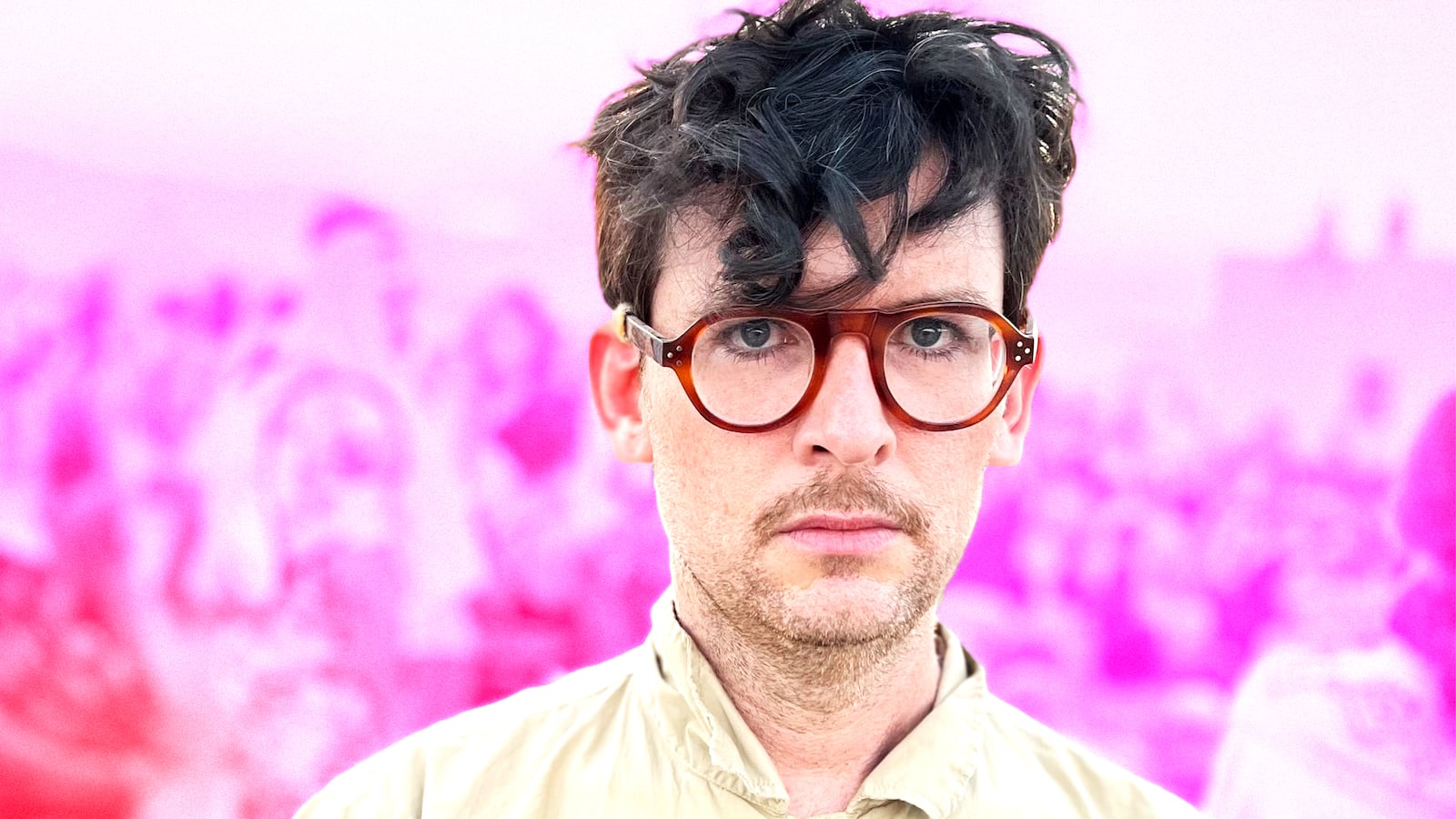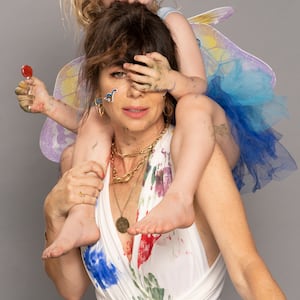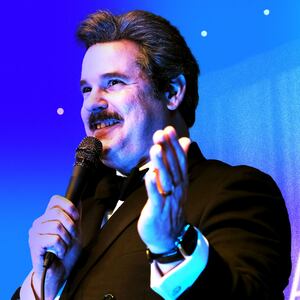Before Moshe Kasher became a stand-up comedian, his life was defined by his intimate connections to Alcoholics Anonymous, the deaf community, rave culture, Burning Man, and Judaism. Each of these distinct communities serve as chapters in his excellent new book, Subculture Vulture: A Memoir in Six Scenes.
In this episode of The Last Laugh podcast, Kasher breaks down how these various identities helped make him the person he is both on and off stage today, from early jokes about growing up with two deaf parents to the Emmy-winning documentary about antisemitism that hits very differently in the wake of the Oct. 7 attacks in Israel. He also reads a passage from the book about how he overcame his inherent skepticism about Burning Man; explains why he feels at home on both sides of the comedy world’s woke vs. anti-woke divide; and shares his reaction to all of the recent attention that his wife, fellow comedian Natasha Leggero, received when she went topless on stage at the Hollywood Improv.
When I point out that he and his wife are having an eventful week, Kasher replies, “Yeah, I guess so,” explaining that he’s been so focused on his book release that he “barely noticed the fact that Natasha broke the internet” by stripping down on stage. “I’m mostly just here for her for moral support. No one’s asked me how I feel about it,” he adds before joking, “I’m furious, I feel betrayed. Those were mine and I’m very upset.”
“No, to be honest with you, I was very proud,” Kasher continues, more sincerely. “I thought it was really punk-rock and really cool. And nothing matters when you really think about it. So if you could do something interesting in this world, I’m all for it. And they’re good. I’m proud to be the roommate of those breasts.”
Amid all of this, Subculture Vulture was released last week, just about 12 years after the publication of his previous memoir, Kasher in the Rye: The True Tale of a White Boy from Oakland Who Became a Drug Addict, Criminal, Mental Patient, and Then Turned 16, which ends on the day that he left rehab for the last time at 15 years old.
“I did that on purpose,” Kasher, now 44, tells me. “I wasn’t really interested in writing a recovery memoir. It was like a snapshot of my life in chaos. I’m happy with where it ended, but I used to get all these messages over the years, like, what happened next? And so this book is in some ways the answer to that question. And what happened next was, like, a lot—the rest of my life.”
The new book is a “comedic history” of the six “scenes” that have defined Kasher’s life: Alcoholics Anonymous, rave culture, Burning Man, the deaf community, Judaism, and stand-up comedy. “I have, for better or for worse, been cobbled together from these six universes,” he explains. “These different worlds that feel like they don’t fit together, or they only fit together through me.”
Kasher’s Jewish identity has admittedly become more complicated in the months since he wrote the book, which has no mention of the current Israel-Gaza war. “It’s a very interesting time to have written a book filled with Jewish history and a deconstruction of antisemitism and the history of the Jewish people, and locked pages way before October 7,” he says, noting that his “primary” feelings about the conflict at this moment are “anguish and heartbreak and hopelessness.”
The comedian also recently won a Daytime Emmy Award for a documentary special he produced and appeared in called Recipe for Change: Standing Up to Antisemitism, which feels both more relevant and somehow out of step since it premiered last year. “It was literally ahead of its time in that I posted that we were nominated for an Emmy, and everybody was in my comments like, ‘That’s not the topic right now! Don’t you know what’s happening?’” Kasher recalls, acknowledging that it was conceived and made back when everyone was still focused on Kanye West.
Each section of the book represents a different life path that he could have taken, culminating with the world of stand-up comedy, which he discovered through his high school friend, comedian Chelsea Peretti, who took him to his first real stand-up show during a visit to New York while he was still in college. On the bill that night were Patrice O’Neal and Sarah Silverman.
“I listened to Patrice and Sarah do stand-up, and I wasn’t offended or appalled, but I was definitely shocked that you could do that,” Kasher recalls. Specifically, he remembers that O’Neal spent part of his set making fun of Michael J. Fox. “And I’m sitting there going, you can’t do that! You can’t make fun of Michael J. Fox being sick. It’s so wrong,” he says now. “And then everybody’s laughing. It was this real reconfiguration of what you can do—or what I could do—with my writing. You can just be funny for the sake of itself.”
In some ways, the two comedians Kasher saw that night represent two different sides of the comedy world. On the one hand, O’Neal, who died in 2011 from complications of a stroke, embodied the anti-woke, “never apologize for a joke” movement; on the other, Silverman represents the more progressive alt-comedy scene (though despite her obvious sensitivities, she is no stranger to controversy herself).
In his book, Kasher calls this present moment a “profoundly annoying time to be a comic” as stand-ups take “refuge in comedic echo chambers, rejecting one another as unfunny or insufferable if they came to jokes from different political standpoints.”
And with half of the comedy world ranting about “woke progressive idiots” and the other bemoaning “racist, awful, sexist losers,” as he puts it, Kasher’s not sure that two comics with such diverging points of view would even share the stage 20 years later.
“I feel like I fit directly between those two worlds,” he says. “I like to be offensive, but I also don’t like to willfully hurt people. I’m sort of somewhere in the middle.” Kasher realizes that middle ground might not be great for business. “There’s a lot of times I wish that I was more of a polemicist on one side or the other,” he adds. “I do feel like that extreme has become more and more popular, in either direction. That’s a path to garner a fan base.”
Not long ago, Kasher was getting ready to perform alongside a handful of other comics at The Comedy Store in Los Angeles and noticed a comment about the show on social media that read, “Can you please list which of these comedians have Trump Derangement Syndrome, because nobody other than liberals wants to see those comedians.”
“I’m sorry, who’s deranged?” he remembers thinking. “You don’t want to see any comedian that doesn’t adhere to your political framework 100 percent? The only entertainer you can watch is somebody that checks off every single thing you believe in?”
For all of the different ways his life could have gone, Kasher ultimately feels like comedy was his “destiny,” even if that’s only something he can “see in hindsight.”
“At least half of comedians that I know watched comedy their whole life and knew that they were going to end up on a stage,” he says. “I had no idea where I was going. I didn’t know if I was going to live to be 18 at the beginning of the book. And some of my friends didn’t.”
Listen to the episode now and follow The Last Laugh on Apple Podcasts, Spotify, Google, or wherever you get your podcasts to be the first to hear new episodes when they are released every Wednesday.







